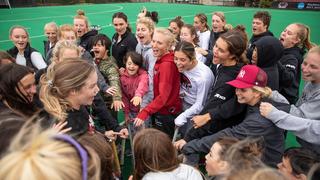SJU Field Hockey Hosts First D1 Adaptive Field Hockey Clinic with PA Revs All Starz
In a cross-campus collaboration, the Saint Joseph’s field hockey team and occupational therapy program welcomed individuals with disabilities to participate in a field hockey clinic on Oct. 21.

After their regular practice, the Saint Joseph’s University field hockey team welcomed athletes with disabilities to enjoy the sport they love. The student-athletes, alongside members of the occupational therapy department, hosted the PA Revs All Starz’s first adaptive field hockey clinic at a Division 1 university on Oct. 21.
Hannah Prince, head coach of the SJU field hockey team, first heard of the Pennsylvania-based field hockey club’s program when she nannied for a family with a young girl, Nadia, who has Down syndrome. During a visit to the family, she brought Nadia to one of the clinics and knew it was something she wanted to introduce to St. Joe’s.
“It brought people together to play a sport that some people might not think would be possible [for individuals with disabilities] but it certainly is,” says Prince.
The program aims to provide opportunities for individuals ages 6 and older with physical and developmental disabilities to participate in the sport.
Saint Joseph’s student-athletes were eager to jump in — the entire team volunteered and matched up with participants — and students from the Department of Occupational Therapy also joined to assist and get hands-on experience. The volunteers helped adapt the game to fit the needs of the participants. They practiced dribbling and shooting drills and enjoyed lots of smiles and high-fives.
Leigh James ’23, ’24 (MS) a captain on the SJU field hockey team, says one of the participants she interacted with was celebrating her birthday and exclaimed that she wanted to spend every birthday like this. James felt equally as enthused being able to share her love for the game.
“It ended up being one of my favorite days with our team — probably through all of college — so it was a really impactful experience," says James.
For Coach Prince and her players, some of the team values they try to encapsulate include active community engagement, acting as role models and being positive student-athletes.
“We always say winning on the scoreboard is the goal, but only if it inspires us to be better people,” says Prince. “We're in the middle of the season — we could just choose to focus on ourselves and just practice-game on repeat, but this is a great way to let the team give back to their community to share their passion for the game.”
She adds, “It’s also enlightening to see how hard some people work to do things that we take for granted,” says Prince. “The game they play definitely takes a different level of effort and creativity and it's inspiring to see how other people can overcome struggles and persevere and be successful.”
Nicole Roberts, OTD, MOT, OTR/L, clinical assistant professor of occupational therapy, also participated in the clinic alongside some of her OT students. She says the hands-on experience is invaluable and something that can’t be simulated in a classroom.
“Really at the heart of occupational therapy is people's motivations,” says Roberts. “What are their goals and how can we support them? Adapting athletic equipment follows a lot of the principles — how can we help this person to participate in an activity or an occupation? And that could be anything from, in this case, modifying a stick or attaching it to a walker so that a child could participate.”
For James, the experience opened up her eyes to the way field hockey can make an impact on the surrounding community.
One of the participants shared enthusiastically that St. Joe’s is her favorite team and crimson and gray her favorite colors. When she gets older, she wants to be on the team herself.
“Sometimes athletics can kind of be seen as a pool of its own, but to be able to combine with other resources that we have at the University and also resources in our community, we have the ability to come together and do something that's really impactful," says James. “I think it speaks a lot to the kind of University that we have and how many great things we have at our disposal here that we can use to help the greater community.”
